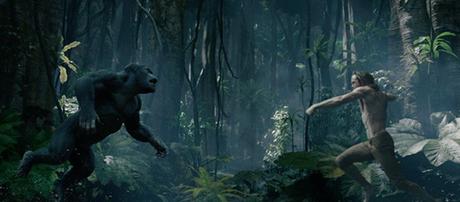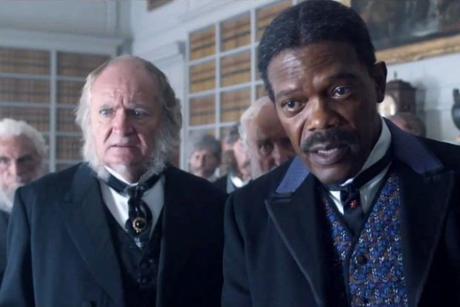
Here's a very brief history of the superhero: Through literature (The Scarlet Pimpernel, Tarzan, John Carter of Mars), pulp novels (Zorro, Doc Savage, Buck Rogers, The Shadow) and newspaper comic strips (Flash Gordon, The Phantom), there were a bunch of characters who were kind of, sort of like superheros, and then in 1938 there was Superman.
Boom. Done. The Big Blue Boy Scout was the perfect distillation of everything that came before as well as the groundbreaking new standard by which all subsequent superheroes were measured. He endured into the next century, invading all forms of media, simultaneously anchoring a film series AND TV show on more than one occasion. However, those proto-superheroes who predated the Man of Steel eventually faded from pop culture prominence, some faster than others. For example, by the time The Shadow (1994) and The Phantom (1996) received the Hollywood movie treatment almost everyone had long since forgotten about them as characters. In both cases, the films went down as financial and artistic failures.
History repeated itself with John Carter (2012), a box office flop of such epic proportions that there's an entire book about the production's long road to ruin. Now, it might be happening again with The Legend of Tarzan, Warner Bros.' costly update of a character - a British aristocrat stranded in the jungle as a baby and raised by gorillas - who once ruled the silver screen from the 1930s into the 60s but has not enjoyed the same level of popularity since, despite a brief resurgence after Disney's Tarzan in 1999.
The $180 million production from the guy (David Yates) who directed the final run of Harry Potter movies and starring that gorgeous, muscle-bound Swede from True Blood (Alexander Skarsgard) came in above its first-weekend expectations, but that still wasn't good enough, not at that budget level. The Hollywood Reporter just called Legend one of the biggest all-time misses for any new movie released over the Fourth of July. Forbes has already devoted multiple thinkpieces to making sure everyone truly gets the following point: By letting the budget grow so high, WB unwittingly ensured Legend has to become the highest-grossing Tarzan film of all time just to break even. After a sub-$50m domestic debut, Legend will need a far-better-than-unusual international showing to reach that break-even plateau.
Here's the inconvenient truth lost in all of this financial hand-wringing: The Legend of Tarzan is actually a pretty good movie. It has some significant third act problems, but what else is new? Most major blockbusters these days start to come apart near the end, if not sooner. The plot is overly reliant on coincidence, and the over-supply of flashbacks saps the forward momentum one too many times. Plus, there's the inevitable "white savior" problem which the film significantly tries to solve but can't completely escape. However, as Time Magazine argued, "Sections of this film are so imaginative, and so lovely, that they deserve our open-heartedness, not our scorn."
Plus, it's one of the best superhero movies of the year.
Tarzan's familiar origin story is told through periodic flashbacks, but we actually meet him in media res, He has long ago left the jungle and returned home to London to live out his days as John Clayton, Earl of Greystoke, with his wife, Jane (Margot Robbie). The local children flock to hear his stories of the jungle, and the local aristocrats lobby him to leverage his celebrity for financial and societal gain, frustrated by his repeated refusals and continued insistence that his life is in London now, not Africa.
At that very moment, Belgian King Leopold II is colonizing the Congo, and his henchman Leon Rom (a shockingly restrained Christoph Waltz) has extended an invitation for Tarzan to return to the Congo to observe the progress being made in the area. It's the 1880s version of a PR stunt. Not everyone is sure about Leopold's intentions in the region. So, pictures of the legendary Tarzan appearing to approve of everything could go a long way.
Or so we think. There's a pretty significant twist in the works, and everything quickly goes south for the heroes.
Tarzan, of course, doesn't know that. He just knows that he'd rather stay home in London, and that if he goes he most definitely doesn't want Jane to go with him. However, Jane, a corset-hating woman ahead of her time, is having none of that noise. An African-American visitor named George Washington Williams (Samuel L. Jackson) convinces Tarzan all is not as it seems in the Congo. There are whispers Leopold, whose government is deeply in debt, is illegally enslaving the natives and using them to continue his search for diamonds. Tarzan, Jane and Williams can accept Rom's invitation and visit the country together, but instead of being turned into a tyrant's puppet they can search for evidence of his apparent wrongdoing.

That being said, Samuel L. Jackson is the little engine that makes this movie go, a classic audience surrogate figure who might as well turn to the camera and blurt out, "Can you believe this shit? Did you just see that? That Tarzan dude is crazy!" If you didn't already know from The Long Kiss Goodnight Jackson is a preternaturally gifted comic foil to a straight man in a buddy pairing. However, his version of Williams is more than mere comic relief. The script calls upon Williams' prior military experience during the American Civil War and in subsequent skirmishes in Mexico and with the Indians to illuminate a greater sense of injustice over what is happening to the Congolese.
Robbie's Jane, who largely grew up in an African village where her father taught English to the natives, is a welcome ray of warmth and sunshine, but it's a sunshine which will quickly burn you if you fuck with it. Much effort has clearly been made to turn Jane into the anti-damsel in distress, and in one key scene their obvious cinematic inspiration is Karen Allen in Raiders of the Lost Ark, a fine choice to emulate. That being said, in the end it still boils down to Tarzan needing to save Jane, and before we reach that point Skarsgard and Robbie have displayed a chemistry which makes their Tarzan and Jane a couple worth rooting for.
Waltz' Rom similarly feels lifted from an Indiana Jones movies, but toned down in transition. It feels like Yates frequently directed him to simply stare intently in the distance, resisting his natural impulse to give in to an over-the-top reaction and bust out a sprawling, Tarantino-esque speech. They might have over-corrected though, turning Rom into a somewhat unremarkable villain. Admirably, the script gifts him a brief "Here's why I'm doing this" moment where the battle lines are drawn according to class distinctions, Rom clearly viewing himself as the rags-to-riches hero and Tarzan as the clueless Aristocrat villain. Predictably, it is Waltz's finest moment.
Skarsgard, meanwhile, plays out a slightly underwritten arc wherein Tarzan has to go home again to realize how much he's been lying to himself about who he really is and where he belongs. That gets a little lost under the many plot twists and amazing action scenes, or maybe we're just too busy gawking at his superhuman-esque physicality to notice his acting (or that his accents keeps going away). His Erik on True Blood was quite often more brood than performance (effectively so), and that might also be the case here. But, hey, this Tarzan is written as a brooding superhero, and Skarsgard definitely looks and acts the part.
Of course, what does that mean to refer to him as a superhero? Tarzan, first seen in Edgard Rice Burrough's Tarzan and the Apes in 1912, is so old he actually predates the first known usage of the word "superhero," but as presented in Legend he is impossibly wealthy, lost his parents as a child, feels compelled to protect his homeland and can do the type of things normal men can't. He can more or less talk to the animals, and appears to have heightened hearing. He's strong enough to hold his own in a fight against a gorilla, and nimble enough to jump from tree to tree.
Give him a cape, tights and a secret identity, and he'd be a classical superhero. But modern superheroes don't need any of those things, and neither does Tarzan. He's as much of a known entity in his world as Iron Man and Captain America are in the MCU, and his costume is a simple pair of pants with no shirt or shoes. He banters with his sidekick Williams much like Cap and Falcon, and his moral journey is ultimately defined by the death of his mother, both the human one and gorilla.
David Yates and company seem to be keenly aware of this, and go out of their way to mimic the cinematic language of superhero movies. A jumbled narrative which piecemeals an origin story via flashback? Thank you, Batman Begins. A retired hero reluctantly heading back into action? Thank you, Dark Knight Rises. A closed quarters fight scene which steadily builds and includes a quick little joke before the first punch is thrown? Thank you, Captain America: Winter Soldier. Majestic shots of a superhero swinging from one great height to another? Thank you, Spider-Man. In fact, the final shot of Tarzan almost directly mimics the final shot of Sam Raimi's first Spider-Man.
They manage to make it all seem so fun, sometimes in slightly stupid ways. It's hard not to laugh a little when Tarzan greets lions with a good neck nuzzle. It's a completely weird sight, but it's supposed to be a little funny. That's part of the film's appeal. It's an idiosyncratic superhero movie, one where the hero not only has to save all humans but also animals, counting among his closest friends an American journalist and a gigantic gorilla he thinks of as his adopted brother. It gives us the familiar through the story of a very old character, one who predates even Superman, and it's totally worth seeing, especially in this summer of disappointing blockbusters.
ROTTENTOMATOES CONSENSUS 34% - "The Legend of Tarzan has more on its mind than many movies starring the classic character, but that isn't enough to make up for its generic plot or sluggish pace"
